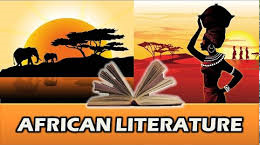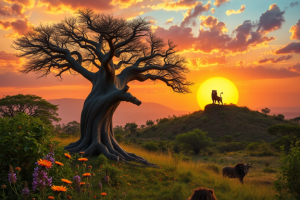
In many parts of Africa, literature and art have long served as powerful tools for expression, resistance, and social change. However, political intervention has often led to the manipulation, censorship, and abuse of these vital forms of cultural expression. This article explores how political forces distort literature and art in Africa, examining the implications for society and the individual artist.
Throughout Africa’s history, literature and art have been deeply intertwined with the continent’s political landscape. Colonial powers often used cultural suppression to exert control, stifling indigenous voices and promoting colonial narratives. Post-independence, many African nations struggled with authoritarian regimes that viewed literature and art as threats to their power. As a result, artists and writers faced censorship, imprisonment, or even violence for their work.
Political regimes in Africa frequently employ censorship as a tool to control artistic expression. Governments may ban books, suppress performances, or restrict access to visual art that critiques their policies. For instance, in countries like Zimbabwe and Eritrea, writers and artists have faced severe repercussions for addressing sensitive topics such as corruption, human rights abuses, and the legacy of colonialism.
Nigeria offers a poignant example of political intervention in literature and art. The country’s complex history of military rule and democratic transitions has led to fluctuating levels of artistic freedom. Writers like Chimamanda Ngozi Adichie and Wole Soyinka have used their platforms to challenge political authority, but many others have faced intimidation or exile. The impact of this censorship is profound, as it not only silences dissenting voices but also impoverishes the national dialogue.
In many instances, political leaders have sought to co-opt literature and art to promote their agendas. This manipulation transforms creative works into mere propaganda, stripping them of their authenticity. Artists may be pressured to align their work with state narratives, compromising their integrity in the process.
In Ethiopia, the government has historically funded artists to produce works that glorify the state. This has led to a culture where artistic expression often serves political ends rather than genuine creative exploration. While some artists navigate this complex landscape successfully, many feel constrained by the expectations imposed upon them.
The abuse of literature and art due to political intervention has far-reaching consequences for society. When creative expression is stifled, the diverse voices that contribute to national identity and culture are silenced. This not only limits the scope of public discourse but also hinders the potential for social change. Literature and art have the power to inspire movements, challenge injustices, and foster empathy; when these mediums are compromised, society suffers.
Despite these challenges, African artists and writers continue to resist and innovate. Many have found ways to navigate censorship, using allegory, metaphor, and subtext to convey their messages. The rise of digital platforms has also provided new avenues for expression, allowing artists to reach wider audiences and circumvent traditional gatekeepers.
The advent of social media has empowered a new generation of African artists and writers to share their work without the constraints of traditional publishing. Platforms like instagram and twitter (X) have become spaces for activism and artistic expression, fostering a vibrant community of voices that challenge the status quo. This digital revolution reflects a shift towards resilience, where art and literature become tools for advocacy and change.
The abuse of literature and art due to political intervention in Africa is a pressing concern that affects not only artists but society as a whole. While the challenges are significant, the resilience of African creative offers hope. By continuing to push boundaries and explore new forms of expression, they keep the spirit of resistance alive, ensuring that art and literature remain vital components of the fight for justice and freedom. As Africa navigates its complex political landscape, the power of creative expression will be essential in shaping a future that honors diverse voices and experiences.
African literature has made significant contributions to global culture and thought, offering unique perspectives that reflect the continent’s rich history, diverse cultures, and complex social issues. From novels and poetry to oral traditions, African writers and artists have captivated audiences worldwide with their profound narratives and evocative imagery. Thus, it is of paramount importance to highlights some renowned African authors, poets, and artists whose works have left an indelible mark on literature and the arts.
Chinua Achebe, often regarded as the father of African literature in English, is best known for his groundbreaking novel “Things Fall Apart” (1958). This work explores the impact of colonialism on traditional Igbo society and has been translated into numerous languages. Achebe’s storytelling style combines rich cultural elements with a critique of colonial narratives, making his work essential for understanding the complexities of African identity.
Ngũgĩ wa Thiong’o, a Kenyan writer and academic, has been a vocal advocate for the use of indigenous languages in literature. His novel “A Grain of Wheat” (1967) delves into the struggles for independence in Kenya, highlighting themes of betrayal and sacrifice. Ngũgĩ’s later works, such as “Decolonising the Mind,” argue for the importance of cultural expression in native languages, influencing a generation of writers across Africa.
Chimamanda Ngozi Adichie is a contemporary Nigerian author whose novels, including “Half of a Yellow Sun” (2006) and “Americana” (2013), explore themes of identity, race, and feminism. Adichie’s work has received international acclaim, and her TED Talk, “We Should All Be Feminists,” has sparked global conversations about gender equality. Her ability to weave personal narratives with broader social issues has resonated with readers worldwide.
Leopold Sedar Senghor, the first president of Senegal, was also a prominent poet and a key figure in the Négritude literary movement. His poetry, characterized by its celebration of African culture and identity, often reflects his belief in the spiritual and aesthetic values of African traditions. Works like “Chants d’ombre” (1945) articulate the beauty of African landscapes and the richness of its cultures, influencing both African and global literary landscapes.
Warsan Shire, a Somali-British poet, gained international recognition for her poignant explorations of displacement and identity. Her poetry collection “Teaching My Mother How to Give Birth” (2011) addresses themes of migration, trauma, and the female experience. Shire’s work has resonated with many, particularly in the context of the ongoing refugee crises, making her voice vital in contemporary discussions of belonging and identity.
Nigerian-British artist Yinka Shonibare is known for his vibrant and thought-provoking installations that challenge colonial narratives and examine cultural identity. His use of Dutch wax fabric, often associated with African identity, in conjunction with Victorian-style sculptures, creates a dialogue about globalization and cultural hybridity. Shonibare’s work has been exhibited worldwide, fostering a deeper understanding of post-colonial issues.
El Anatsui, a Ghanaian sculptor, is renowned for his large-scale installations made from discarded bottle caps and other materials. His work, including the stunning piece “Earth’s Skin,” reflects themes of consumption, waste, and the interconnectedness of cultures. Anatsui’s art not only showcases African craftsmanship but also engages with global environmental issues, making it relevant to contemporary audiences.
The contributions of African literature and art to the global cultural landscape are both profound and diverse. Renowned authors, poets, and artists have opened new avenues for understanding the complexities of identity, culture, and history. As the world continues to grapple with issues of colonialism, migration, and social justice, the voices of African writers and artists remain crucial in fostering empathy and dialogue. Their works not only celebrate African heritage but also enrich the universal narratives that connect us all.
BY LAKACHEW ATINAFU
THE ETHIOPIAN HERALD FRIDAY 25 APRIL 2025





